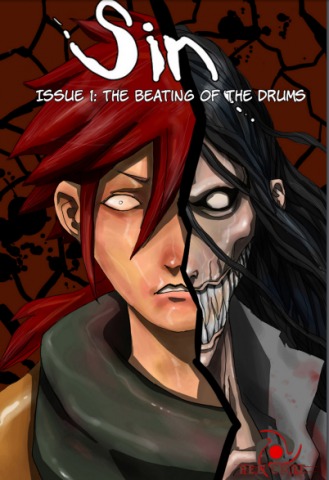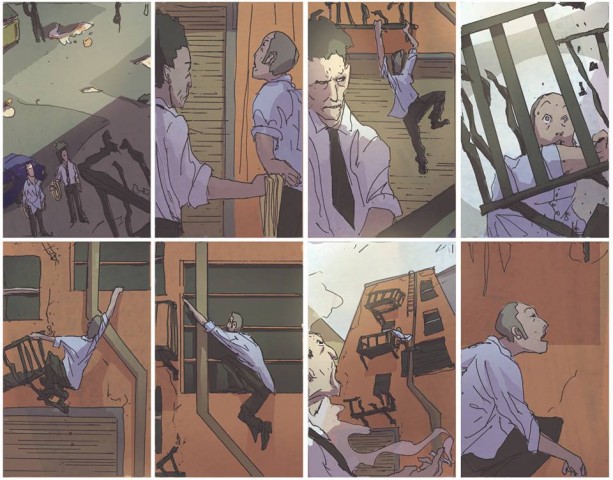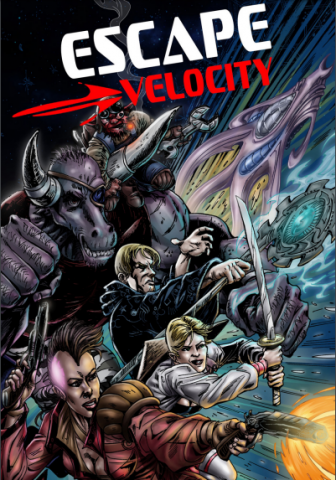
Ian: Octal is described as “a curated catalog of comic pitch packets” can you describe exactly what that means?
Mike: A pitch packet is the material one would use to propose a comic book/ series to potential publishers. In the wild, there is no standard format or set components. Each publisher has their own unique guidelines and it’s rare to see complete pitch packets shared publicly. While often shrouded in mystery, pitching is one of the biggest barriers to entry for comic creators.
Octal compared the submission guidelines from a bevy of comic publishers, identified the grouping of materials which would satisfy most simultaneously, created templates ( with editorial feedback ) to standardize the pitch packets, and produced a volume to establish a quality standard. Upon completion, each volume of Octal is sent to a mailing list of submission editors from over two dozen publishers ( and counting ), who have subscribed to receive the catalog and review its featured packets.
Ian: Can you explain the functions of Octal as an anthology vs. a pitch packet?
Mike: Because each pitch packet is built around an 8-page pilot story, Octal reads like a comic anthology while providing first looks at potential books/ series. Octal Volume 1 is currently available through DriveThru Comics and Comixology. Copies sold to the general audience help offset the cost of production. Readers making their voices heard for the comics they’d like to see developed further only increases the odds of a book/ series launching.
The main difference between Octal and an atypical anthology is that each 8-page story comes bundled with a mock cover, creators page with links and bios, design page of production art, and a one-sheet which breaks down the proposed book/ series.
Ian: Do the artists create an eight page preview specifically for Octal?
Mike: It depends on the creative team. Besides original book/ series proposals, Octal welcomes proposals for English translations of foreign language comics, collections of serialized comics/ strips, print editions of web comics, reprints of out-of-print comics, etc. Depending on what materials the team has already produced, they may be able to redux most of the components from that previously produced material.
Also, it’s not an 8-page preview; It’s an 8-page pilot. A pilot is a short story which demonstrates a creators ability to arc a narrative and pay off setups while establishing the tone, allowing us to see the characters/ world in action, and offering a taste of the sort of experience we’re in for if the pilot is ordered to book/ series. A successful pilot should be able to stand alone and still be entertaining. It’s easier to build on success than sell people on theory.

Ian: What is the reason behind limiting the creators to eight pages and does it have to do with submission guidelines of comic publishers?
Mike: That’s exactly it. Most of the publishers who ask for samples accept a maximum of 8 pages. Most of the publishers who want to see a complete story have a minimum of 8 pages. While any given publisher will ask for a range of lengths, 8 pages happens to be the sweet spot where you satisfy the most simultaneously. ( This is where the series gets it’s name. Octal(n): A base-8 system. )
This is true across the board. While each publisher may offer a lot of flexibility, when you composite their guidelines, the range narrows. It’s a trade off. You end up working with stricter guidelines but the results are more universally accepted. None of this limits the contents of your proposed book/ series, just the structure in which that proposal is presented.
Ian: Is the overall goal to get these artists a publishing deal?
Mike: Yes. The goal of Octal is to see the featured proposals launch into their own book/ series with different publishers.
Ian: How do publishers get a hold of Octal? Do you have contacts with certain publishers?
Mike: Currently we have submission editors from over two dozen comic publishers subscribed to receive the catalog and review its featured packets. The current mailing list ranges from imprints of tier-2 publishers to smaller boutique operations. Octal is free for all editors and publishing staff. If interested in subscribing (or reviewing a volume before subscribing) they need only email neofluxproductions@gmail.com and state their name, publisher, and position.
I don’t mention the specific publishers only because I believe until they find a book/ series they’d like to publish through Octal, they’re doing us a favor. Once something launches, then it’s mutually beneficial to promote that release.
Ian: How much of Octal is created by the artists with the books featured and how much is made for Octal specifically?
Mike: That depends on the team and what they’ve already produced. Still, the terms are fully non-exclusive so even if the creators use the Octal templates, are assisted by editorial feedback, and have their packet featured in the catalog, they’re still free to take that material and pitch it to publishers directly or use it for their crowd-sourcing campaigns, if they decide to go that route.

Ian: What is the purpose of the artist page where they introduce themselves? Are they designed to appeal to the publisher, reader, or both?
Mike: I think you answered your own question. The creators page introduces the creators. Work isn’t produced in a bubble. Past credits and accolades help to vet creators and demonstrate an audience. For readers, it also points them toward the creators’ past works should they see something in Octal which resonates with them.
Ian: Do the artists write their own bios and book descriptions?
Mike: Most of the packets ( like most comics ) are produced by a team of creators. Creators form their own teams with their own terms and divide up the tasks however they deem fit. Octal stipulates that the team producing the packet must be the same team the packet is proposing for the book/ series. So, everything in the pitch packet is produced by that team but who does what is something they sort among themselves.
Ian: Are some of the things like production time and issue length subject to change or negotiation with publishers?
Mike: Think of the proposal as a starting offer. An interested publisher may counter and the creators may choose to accept, reject, or counter their proposal. Some creators are more open to negotiation than others. Some publishers are more hands on than others. Beyond the catalog, it’s really a snowflake scenario.
Ian: What does Octal get if a book gets published?
Mike: Octal has no stake in whatever deal is struck between the creators and publishers but each packet that launches from Octal makes our job a little easier. Proven success attracts more/ better creators which increases both the quality and quantity of Octal volumes. A better book is easier to promote and a tighter release schedule allows us to get more out of each promotion. This would also attract more publishers to the mailing list which increases the draw for creators and likelihood of more packets launching from subsequent volumes.

Ian: What are the overall goals for Octal?
Mike: At the moment, the goal is to prove its utility and see if it can be self-sustaining. If copies sold exceed the cost of production and promotion then we can bring in additional staff, provide additional resources for creators, and pay ourselves a salary. If copies sold fall short of the cost but it proves its utility, then we’ll need to either seek outside funding, go the paetron route, or introduce an entry fee. (We’ll be assessing that status on June 10th. Any packet submitted before then is grandfathered in to the current terms even if an entry fee needs to be introduced.) If it fails to prove it’s utility, then it was still a worthy pursuit but the fact that dozens of publishers have already subscribed, one of the packets has already locked down a series contract, and another packet is currently in contract negotiations suggests that proving the utility won’t be an issue.
In more general terms, transparency increases quality and awareness leads to appreciation. When has art ever been hurt by understanding? Early in development, I interviewed both creators and editors about their pitching experiences. Many creators offered up suggestions based on what has worked for them in the past. While some tips were practical and helped inform the packet templates, just as many were tantamount to wearing your lucky socks while slaughtering a goat to the gods of green light. On the publishing end, while some editors opened up after talking a bit, often the knee jerk response to any question about pitching was to point out that there is no magic bullet, secret handshake, etc. Let’s save that sort of mysticism for the comics.
Ian: Can people see the guidelines anywhere like an Octal Comic website?
Mike: The aforementioned templates and an instruction manual breaking down terms, procedure, and the packet components are available at the Octal website and creators on Facebook can also join our production group.
Ian: Just for fun; what is your favorite comic?
Mike: My favorite comic of all time has to be The Awesome Slapstick. He’s a cartoon in an increasingly realistic world and that contrast is great. Who doesn’t love hammer space.
Ian: Where can people get a hold of Octal?
Octal Volume 1 is currently available through DriveThru Comics and Comixology. Press writers and podcasters, can e-mail neofluxproductions@gmail.com for review copies/ to schedule interviews. Editors and publishing staff, if you’d like to be added to Octal’s mailing list (or to review a copy before subscribing) e-mail neofluxproductions@gmail.com.
















